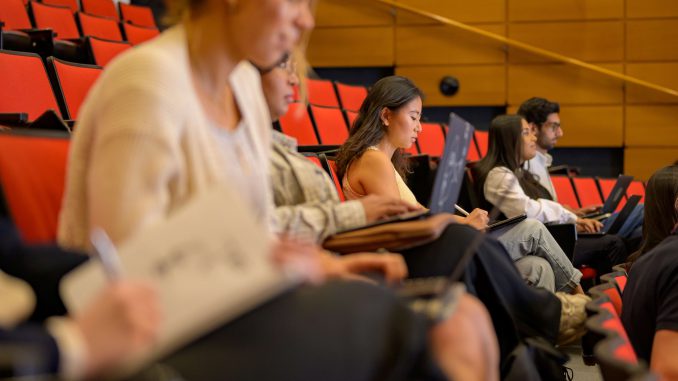
Written by Anysia Mehta, MSc Neuroscience student
As individuals, we often put a lot of pressure on ourselves. However, it’s important to remember that sometimes your best is enough and that everyone’s journey from undergrad to postgrad is different.
Some people find it to be a smooth transition. While for others, it can be challenging, not only at the beginning of the academic year but throughout. There can be various reasons for this, such as choosing to pursue a master’s in a different field or at a different university. Even those who decide to stay at the same institution and pursue a master’s in the same subject area as their undergrad may face difficulties along the way. Postgraduate degrees can be extremely demanding and requires a lot more independent work compared to undergrad, which can make it tricky to navigate.
In terms of my experiences, completing my undergraduate degree was entirely different from my postgraduate experience. I studied Psychology for my undergrad but decided to pursue Neuroscience for my postgrad. Additionally, I wanted to live independently for my undergraduate degree, but for my postgrad, I opted to live at home and attend a university in London. Before starting my postgraduate degree, I decided to take a year out, which turned into two due to the pandemic. During this time, I worked and volunteered to gain some life experience.
Completing a master’s degree has had its share of ups and downs for me. While I enjoyed learning the course content and serving as a course rep, I struggled with re-learning Chemistry and Biology as I hadn’t studied them since my GCSEs. It was comforting to know that other students who didn’t come from a Biosciences background felt out of place as well. Even those with a Bio/Chem background found the course to be demanding. Throughout the year, I found it difficult to balance extracurriculars both inside and outside of the university, which could be overwhelming at times.
Here are some helpful tips and advice 😊:
- Before starting your course, try to keep your mind active by engaging in light Summer reading or watching YouTube videos on the topics you may explore in the course. This can make it easier for you to get back into academic life.
- It’s okay if you don’t understand everything you’re taught in term 1. It takes time to adjust to getting back into education and a demanding course.
- Take breaks and step away when you need to. The last thing you want to do is burn out.
- Maintain a healthy work/life balance. Take time for yourself, whether that means socialising, joining a sports team, or taking a rest day. Your time at university isn’t solely for completing assignments, exams, and revising. You’re allowed to participate in other extracurricular activities you enjoy. King’s College London emphasises the importance of maintaining positive mental health and support.
- It’s possible to do too much, so make sure you are not pushing yourself to the breaking point.
- If you’re struggling to keep up with the workload, please speak to your Course Lead, as they can guide you in the right direction and provide advice.
- If you’re experiencing poor mental health, King’s offers various services for support, including speaking with a member of the well-being team or signing up for in-house counselling, both of which are free!
Whatever happens, I wish you the best of luck and hope you enjoy your Postgraduate journey!

Leave a Reply